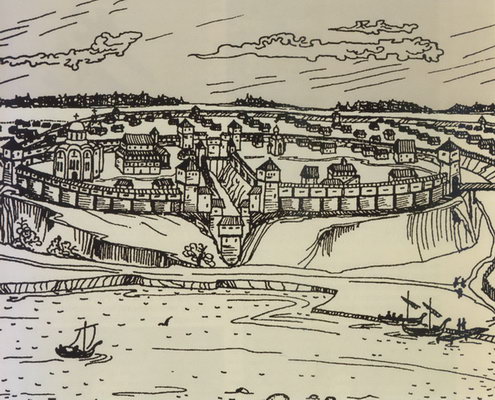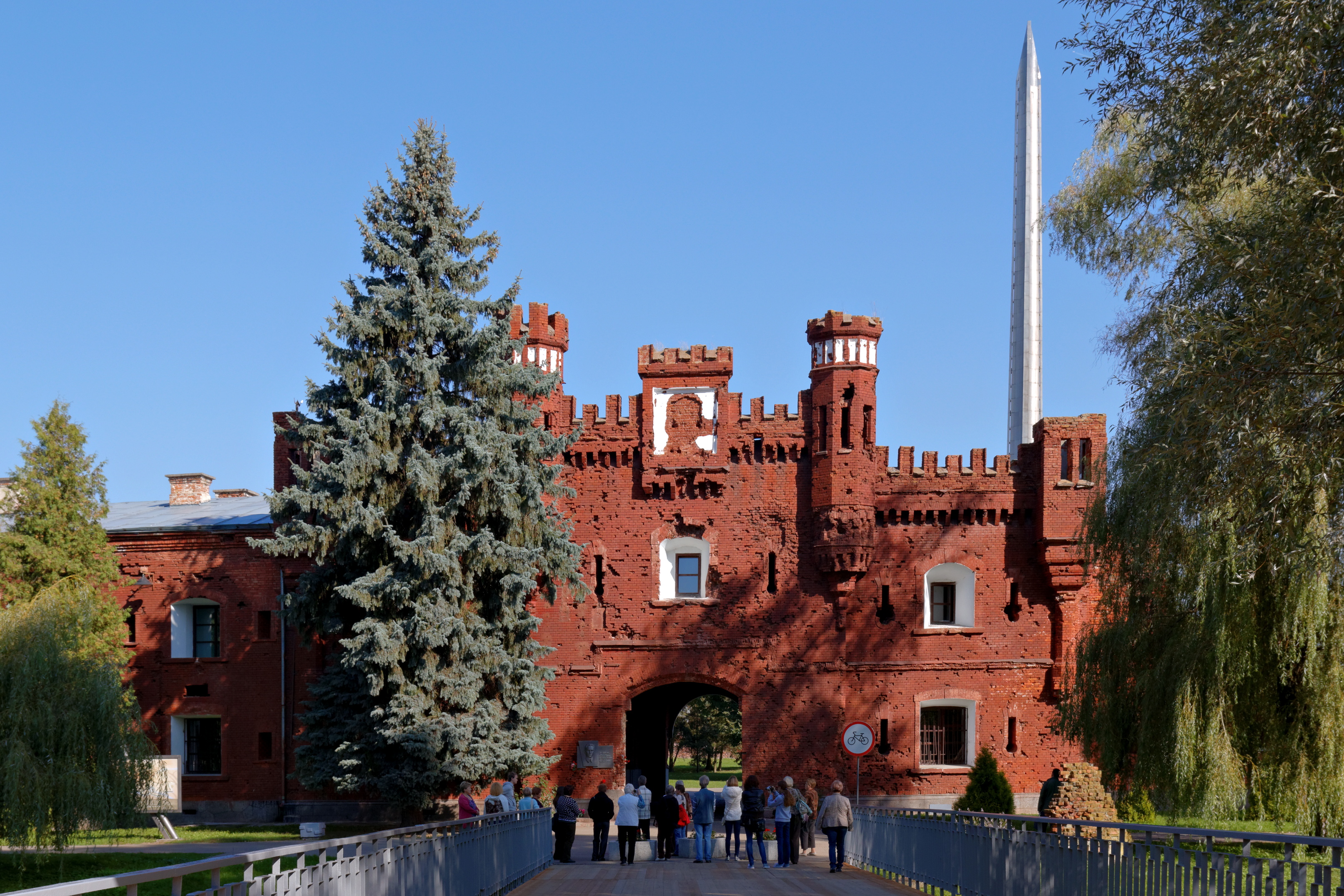|
Ivan Akhremchik
Ivan Osipovich Akhremchik ( be, Іва́н Во́сіпавіч Ахрэ́мчык, russian: Ива́н О́сипович Ахре́мчик; 16 December 1903, Minsk, Russian Empire - 9 March 1971, Minsk) was a Belarusian painter specializing in portraits. In 1949, he received the title People's Artist of the BSSR. Biography Akhremchik graduated from the Moscow Institute of Arts and Technology in 1930. After graduation, he worked in the genre of easel and monumental painting. In the 1930s, he painted "The Arrival of the Red Army in Minsk" and "Osintorf". In the post-war period, he painted murals in the Young Spectators' Theatre and the Belarusian Association of the Cultural Union in Minsk, Belarus (together with I. A. Davidovich). Since 1921, Akhremchik had been taking part in exhibitions of various levels from regional to all-Union. The most famous works of Akhremchik's easel art is the painting "Defense of the Brest Fortress" and a portrait of the People's Artist of the ... [...More Info...] [...Related Items...] OR: [Wikipedia] [Google] [Baidu] |
Minsk
Minsk ( be, Мінск ; russian: Минск) is the capital and the largest city of Belarus, located on the Svislach (Berezina), Svislach and the now subterranean Nyamiha, Niamiha rivers. As the capital, Minsk has a special administrative status in Belarus and is the administrative centre of Minsk Region (oblast, voblast) and Minsk District (Raion, raion). As of January 2021, its population was 2 million, making Minsk the Largest cities in Europe, 11th most populous city in Europe. Minsk is one of the administrative capitals of the Commonwealth of Independent States (CIS) and the Eurasian Economic Union (EAEU). First documented in 1067, Minsk became the capital of the Principality of Minsk before being annexed by the Grand Duchy of Lithuania in 1242. It received town privileges in 1499. From 1569, it was the capital of the Minsk Voivodeship, an administrative division of the Polish–Lithuanian Commonwealth. It was part of a region annexed by the Russian Empire in 1793, as a c ... [...More Info...] [...Related Items...] OR: [Wikipedia] [Google] [Baidu] |
Russian Empire
The Russian Empire was an empire and the final period of the List of Russian monarchs, Russian monarchy from 1721 to 1917, ruling across large parts of Eurasia. It succeeded the Tsardom of Russia following the Treaty of Nystad, which ended the Great Northern War. The rise of the Russian Empire coincided with the decline of neighbouring rival powers: the Swedish Empire, the Polish–Lithuanian Commonwealth, Qajar Iran, the Ottoman Empire, and Qing dynasty, Qing China. It also held colonies in North America between 1799 and 1867. Covering an area of approximately , it remains the list of largest empires, third-largest empire in history, surpassed only by the British Empire and the Mongol Empire; it ruled over a population of 125.6 million people per the Russian Empire Census, 1897 Russian census, which was the only census carried out during the entire imperial period. Owing to its geographic extent across three continents at its peak, it featured great ethnic, linguistic, re ... [...More Info...] [...Related Items...] OR: [Wikipedia] [Google] [Baidu] |
Gleb Glebov
Gleb Pavlovich Glebov (real surname Sorokin; Belarusian: ''Глеб Паўлавіч Глебаў''; May 11, 1899 – March 3, 1967) was a Soviet and Belarusian theater and film actor. People's Artist of the USSR (1948). Biography Glebov was born on April 29 (May 11; NS), 1899 in Voznesensk (now Mykolaiv region of Ukraine) (according to other sources, in Voskresensk, now Moscow region) in the family of a railway employee, who was an aspiring actor. In 1920, he graduated from the Bendera men's gymnasium. From 1920 to 1921, he studied at the Odessa Polytechnic Institute. From 1921 to 1923, Glebov was an actor of the Odessa Russian Drama Group (now the Odesa Oblast Academic Drama Theater); from 1924 to 1925, the Nikolaev Theater of Russian Drama (now the Mykolaiv Academic Artistic Drama Theater); from 1925 to 1926, the Voznesensk Russian Drama Theater. From 1926, Glebov was an actor of the 1st Belarusian Drama Theater (now the Yanka Kupala National Academic Theater), and bet ... [...More Info...] [...Related Items...] OR: [Wikipedia] [Google] [Baidu] |
Gomel
Gomel (russian: Гомель, ) or Homiel ( be, Гомель, ) is the administrative centre of Gomel Region and the second-largest city in Belarus with 526,872 inhabitants (2015 census). Etymology There are at least six narratives of the origin of the city's name. The most plausible is that the name is derived from the name of the stream Homeyuk, which flowed into the river Sozh near the foot of the hill where the first settlement was founded. Names of other Belarusian cities are formed along these lines: for example, the name Minsk is derived from the river Menka, Polatsk from the river Palata, and Vitsebsk from the river Vitsba. The first appearance of the name, as "Gomy", dates from 1142. Up to the 16th century, the city was mentioned as Hom', Homye, Homiy, Homey, or Homyi. These forms are tentatively explained as derivatives of an unattested ''*gomŭ'' of uncertain meaning. The modern name for the city has been in use only since the 16th or 17th centuries. History U ... [...More Info...] [...Related Items...] OR: [Wikipedia] [Google] [Baidu] |
Brest Fortress
Brest Fortress ( be, Брэсцкая крэпасць, '; pl, Twierdza brzeska, russian: Брестская крепость), formerly known as Brest-Litoŭsk Fortress, is a 19th-century fortress in Brest, Belarus. In 1965, the title " Hero Fortress" was given to the fortress to commemorate the defence of the frontier stronghold during the first week of the Operation Barbarossa when Axis forces invaded the Soviet Union on June 22, 1941. The title "Hero Fortress" corresponds to the title "Hero City" that the Presidium of the Supreme Soviet of the Soviet Union awarded to twelve Soviet cities. Description The Brest fortress has sustained its original outline of a star shaped fortification since its construction in the early 19th century. The Citadel, the core of the fortress, was on the central island formed by the Bug River and the two branches of the Mukhavets River. The island was skirted by a ring of a two-storied barrack with 4 semi-towers. The 1.8 km long ... [...More Info...] [...Related Items...] OR: [Wikipedia] [Google] [Baidu] |
1903 Births
Nineteen or 19 may refer to: * 19 (number), the natural number following 18 and preceding 20 * one of the years 19 BC, AD 19, 1919, 2019 Films * ''19'' (film), a 2001 Japanese film * ''Nineteen'' (film), a 1987 science fiction film Music * 19 (band), a Japanese pop music duo Albums * ''19'' (Adele album), 2008 * ''19'', a 2003 album by Alsou * ''19'', a 2006 album by Evan Yo * ''19'', a 2018 album by MHD * ''19'', one half of the double album '' 63/19'' by Kool A.D. * '' Number Nineteen'', a 1971 album by American jazz pianist Mal Waldron * ''XIX'' (EP), a 2019 EP by 1the9 Songs * "19" (song), a 1985 song by British musician Paul Hardcastle. * "Nineteen", a song by Bad4Good from the 1992 album ''Refugee'' * "Nineteen", a song by Karma to Burn from the 2001 album ''Almost Heathen''. * "Nineteen" (song), a 2007 song by American singer Billy Ray Cyrus. * "Nineteen", a song by Tegan and Sara from the 2007 album '' The Con''. * "XIX" (song), a 2014 song by ... [...More Info...] [...Related Items...] OR: [Wikipedia] [Google] [Baidu] |
1971 Deaths
* The year 1971 had three partial solar eclipses (February 25, July 22 and August 20) and two total lunar eclipses (February 10, and August 6). The world population increased by 2.1% this year, the highest increase in history. Events January * January 2 – 66 people are killed and over 200 injured during a crush in Glasgow, Scotland. * January 5 – The first ever One Day International cricket match is played between Australia and England at the Melbourne Cricket Ground. * January 8 – Tupamaros kidnap Geoffrey Jackson, British ambassador to Uruguay, in Montevideo, keeping him captive until September. * January 9 – Uruguayan president Jorge Pacheco Areco demands emergency powers for 90 days due to kidnappings, and receives them the next day. * January 12 – The landmark United States television sitcom ''All in the Family'', starring Carroll O'Connor as Archie Bunker, debuts on CBS. * January 14 – Seventy Brazilian political prisoners are release ... [...More Info...] [...Related Items...] OR: [Wikipedia] [Google] [Baidu] |
Artists From Minsk
An artist is a person engaged in an activity related to creating art, practicing the arts, or demonstrating an art. The common usage in both everyday speech and academic discourse refers to a practitioner in the visual arts only. However, the term is also often used in the entertainment business, especially in a business context, for musicians and other performers (although less often for actors). "Artiste" (French for artist) is a variant used in English in this context, but this use has become rare. Use of the term "artist" to describe writers is valid, but less common, and mostly restricted to contexts like used in criticism. Dictionary definitions The ''Oxford English Dictionary'' defines the older broad meanings of the term "artist": * A learned person or Master of Arts. * One who pursues a practical science, traditionally medicine, astrology, alchemy, chemistry. * A follower of a pursuit in which skill comes by study or practice. * A follower of a manual art, such as a ... [...More Info...] [...Related Items...] OR: [Wikipedia] [Google] [Baidu] |
People From Minsky Uyezd
A person ( : people) is a being that has certain capacities or attributes such as reason, morality, consciousness or self-consciousness, and being a part of a culturally established form of social relations such as kinship, ownership of property, or legal responsibility. The defining features of personhood and, consequently, what makes a person count as a person, differ widely among cultures and contexts. In addition to the question of personhood, of what makes a being count as a person to begin with, there are further questions about personal identity and self: both about what makes any particular person that particular person instead of another, and about what makes a person at one time the same person as they were or will be at another time despite any intervening changes. The plural form " people" is often used to refer to an entire nation or ethnic group (as in "a people"), and this was the original meaning of the word; it subsequently acquired its use as a plural ... [...More Info...] [...Related Items...] OR: [Wikipedia] [Google] [Baidu] |
Members Of The Supreme Soviet Of The Byelorussian SSR (1955–1959)
Member may refer to: * Military jury, referred to as "Members" in military jargon * Element (mathematics), an object that belongs to a mathematical set * In object-oriented programming, a member of a class ** Field (computer science), entries in a database ** Member variable, a variable that is associated with a specific object * Limb (anatomy), an appendage of the human or animal body ** Euphemism for penis * Structural component of a truss, connected by nodes * User (computing), a person making use of a computing service, especially on the Internet * Member (geology), a component of a geological formation * Member of parliament * The Members, a British punk rock band * Meronymy, a semantic relationship in linguistics * Church membership, belonging to a local Christian congregation, a Christian denomination and the universal Church * Member, a participant in a club or learned society A learned society (; also learned academy, scholarly society, or academic association) is a ... [...More Info...] [...Related Items...] OR: [Wikipedia] [Google] [Baidu] |





_1938.jpg)